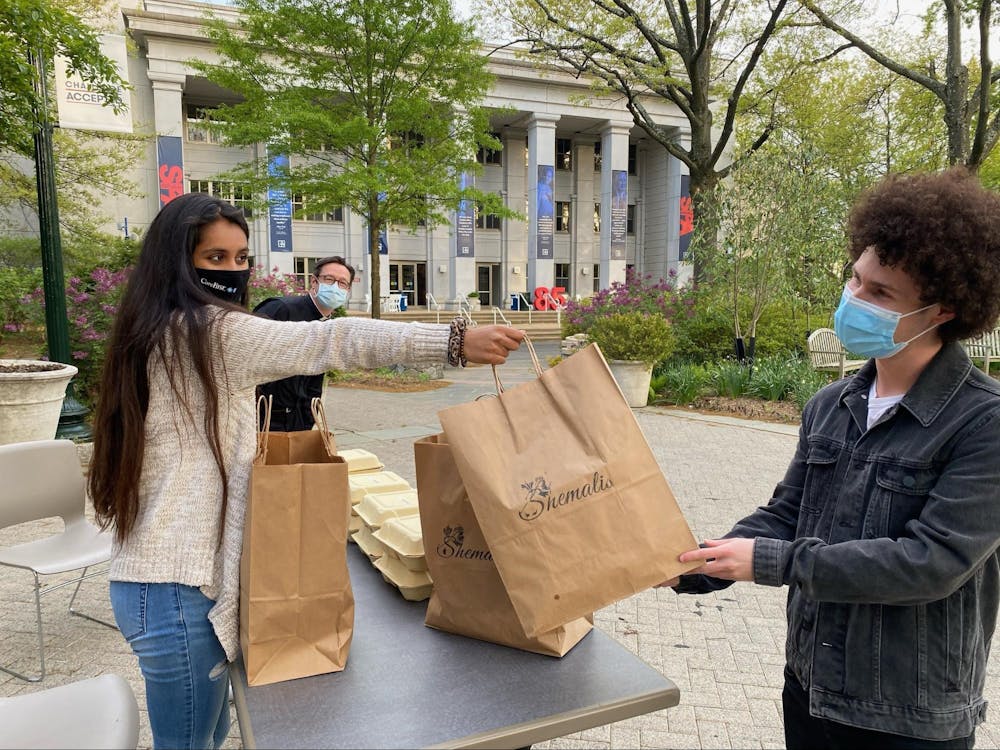A petition that began circulating in late February on social media sparked a conversation among American University students and staff members alike — whether or not Islamophobia is rooted in the School of International Service.
Course subjects and professors’ approaches toward topics like counterterrorism and national security fueled the conversation.
Islamophobia engenders negative stereotypes that continue to discriminate against Muslim- Americans. These Islamophobic tropes are often portrayed in political discourse, everyday media and education. Terms like “Islamic menace” or “violent foreigner” lead to an association between Islam and terrorism which is biased, harmful and many times untrue.
After sophomore Marisa Sette published “How Can You Be a Feminist and Muslim?” in the School of International Service Case Studies in Intercultural Communications, the petition began circulating to have her work removed.
In an email to The Eagle, Sette wrote that she developed the case study “in good faith.”
“I wish the [Muslim Students Association] nothing but the best this Ramadan, and I hope that one day they will see that I never wrote the article with the intention of ill will nor do I hold any in my heart towards any member of their community,” she wrote.
The ensuing controversy sparked a bigger question: is Islamophobia rooted in the SIS?
Momal Rizvi, a sophomore majoring in international studies, would say yes.
“I feel like it’s definitely mixed between some professors,” Rizvi said. “I think that the ones who have touched on [Islam have] tried to do so in a critical way.”
Rizvi said that her Justice, Ethics, and Human Rights in International Affairs course covered the connection between Western feminism and Muslim women. Her professor assigned an article on the topic written by a Muslim woman and agreed with the stance of the article: that Islam can be compatible with feminism.
“Even though my professor took a somewhat positive angle, it was still a weird scenario because I think I was the only Muslim student in that classroom,” Rizvi said.
SIS professor Shadi Mokhtari specializes in the politics and human rights of the Middle East region. Mokhtari said that she is aware of Islamophobic narratives that exist around Islam and Middle East classes, and has actively pushed against them.
“I actually initially taught graduate classes called Islam and IR, Islam and Democracy and Islam and Human Rights. I pushed to change the names of those classes because my view was that the names were a product of post-9/11 thinking. It was like saying all the problems of the Middle East and Muslim-majority countries can be reduced and attributed by Islam, adhering to the good versus bad Muslim dichotomy,” Mokhtari said.
When asked about Islam and the SIS, Mokhtari clarified that each professor has their method of teaching the courses.
“I don’t think there is a specific SIS approach to Islam, there are just a handful of us who are specialists in the region,” Mokhtari said. “The faculty that I know of, who teach Middle East studies and classes related to Islam, are pretty conscious and attuned to Orientalism, savage-victim narratives and Islamophobia. We make sure to address that critique and question the ways it could be applied or misapplied in all of our classes.”
Chris Edelson, an assistant professor in the Department of Government, teaches a class on presidential power in the post-9/11 era. He said he tries to take an objective, factual approach in discussions regarding Islam and debunks common misconceptions about Muslim people and terrorism.
“We talk about the history of terrorism to show that terrorism is not specific to one group; there are all kinds of terrorist groups,” Edelson said. “We talk about coverage issues involving terrorism.”
He also provides students with contemporary examples of terrorism.
“Unfortunately, we’ve had terrorism in the U.S. recently, carried out by people who are not Muslim: the Jan. 6 Capitol attacks,” Edelson said. “When Al-Qaeda carries out a terrorist attack, or ISIS does, it doesn’t mean all Muslims are responsible. When the Proud Boys and the Oath Keepers and QAnon supporters carried out the Jan. 6 attacks, it doesn’t mean that all white people are responsible, or all Christians are responsible.”
Edelson noted that a lot of Americans’ misconceptions of Islam stem from media coverage, which portrays terrorist attacks through an anti-Muslim lens. He references Muslim-American doctor Ayaz Virji, a minority in his rural Midwestern town who spoke to various audiences about Islam.
At his lectures, audience members would acknowledge that Virji himself was not a terrorist, but ask, “Well, why is it that I always see Muslims carrying out terrorist attacks?” Edelson uses Virji’s story to highlight the prevalence of Islamophobic rhetoric in the media.
“Media coverage focuses on attacks by Muslims, and especially in the U.S. and by foreign-born Muslims,” Edelson said. “So I try to bring all this in so [my students] can understand the context.”





